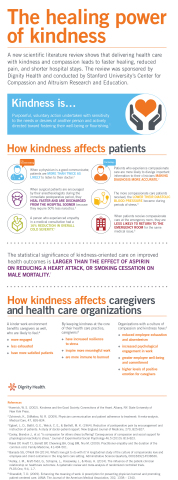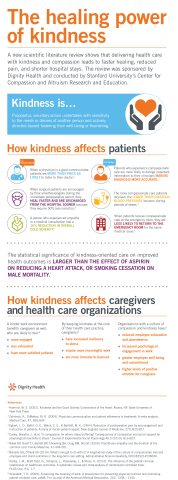SAN FRANCISCO--(BUSINESS WIRE)--Research presented today by neurosurgeon Dr. James R. Doty, M.D., at the inaugural Compassion and Healthcare Conference at Fort Mason shows that health care delivered with kindness not only reduces the duration and severity of the common cold1, but can also lead to improved patient outcomes, including faster healing of wounds2, and a reduction in pain3 and anxiety4. In some instances, the statistical significance of kindness-oriented care on improved outcomes was “larger than the effect of aspirin on reducing [a heart attack] or smoking on male mortality.”5
The review was sponsored by Dignity Health and performed by the Center for Compassion and Altruism Research and Education (CCARE) at the Stanford University School of Medicine.
“This scientific literature review clearly demonstrates that while medicine holds the power to cure, care delivered with kindness and compassion can speed the healing process and lead to better outcomes for patients and caregivers alike,” said Dignity Health president/CEO, Lloyd Dean. “I believe our partnership with Stanford University’s CCARE will help us care for our patients’ mind, body, and spirit more effectively.”
“In every domain of life and especially in health care where fundamentally we are focused on those suffering, kindness and compassion have a profound positive effect,” said Stanford University CCARE’s Founder and Director, Dr. James Doty. “Human kindness, science, and technology form a powerful combination that can save lives, create the environment for healing and by doing so decrease cost.”
The research found that kinder care and better information sharing as a result of compassionate practices can lead to a range of improved health outcomes, including:
- Faster healing of wounds,2
- reduced pain,3
- reduced anxiety,4
- reduced blood pressure,4
- shorter hospital stays,3 and
- even shorter duration and severity of the common cold.1
The scientific literature review also found that kinder care improved the relationship between caregivers and patients, resulting in a number of significant benefits. Specifically, it found that research suggests that “effective information sharing and kindness in clinical interactions yields greater information sharing between patient and care provider, contributes to more accurate diagnosis, increases effectiveness of treatment planning, and boosts the likelihood that patients will follow recommended treatment protocols.”6, 7, 8, 9, 10
A kinder work environment benefits caregivers as well, who are likely to feel more engaged, less exhausted, and have more satisfied patients.11 And according to the scientific literature review, patients who receive kinder care also indicate greater satisfaction with their care. 12
This is the first step in an ongoing effort by Dignity Health and Stanford University’s CCARE to study the effects of kindness in health care.
“We look forward to translating what we’ve learned into practices our caregivers can apply across the entire Dignity Health organization,” Dean added. “We’re excited that our ongoing partnership with Stanford University’s CCARE has yielded actionable, replicable recommendations that can influence the way medicine is practiced.”
For more information, visit dignityhealth.org/compassionweek or ccare.stanford.edu.
About CCARE
The Center for Compassion and Altruism Research and Education (CCARE) at Stanford University School of Medicine was founded in 2008 with the explicit goal of promoting, supporting, and conducting rigorous scientific studies of compassion and altruistic behavior. CCARE collaborates with neuroscientists, behavioral scientists, geneticists and biomedical researchers to examine the physiological and psychological correlates of compassion and altruism.
About Dignity Health
Dignity Health, one of the nation’s largest health care systems, is a 20-state network of nearly 9,000 physicians, 56,000 employees, and more than 400 care centers, including hospitals, urgent and occupational care, imaging centers, home health, and primary care clinics. Headquartered in San Francisco, Dignity Health is dedicated to providing compassionate, high-quality, and affordable patient-centered care with special attention to the poor and underserved. In FY14, Dignity Health provided nearly $2 billion in charitable care and services. For more information, please visit our website at www.dignityhealth.org. You can also follow us on Twitter and Facebook.
References
1) Rakel DP, Hoeft TJ, Barrett BP, Chewning BA, Craig BM, Niu M. (2009). Practitioner empathy and the duration of the common cold. Family Medicine, 41:494-501.
2) Kiecolt-Glaser, J. K., Marucha, P. T., Mercado, A. M., Malarkey, W. B., & Glaser, R. (1995). Slowing of wound healing by psychological stress. The Lancet, 346(8984), 1194-1196.
3) Egbert, L. D., Battit, G. E., Welch, C. E., & Bartlett, M. K. (1964). Reduction of postoperative pain by encouragement and instruction of patients: A study of doctor-patient rapport. New England Journal of Medicine, 270, 825-827.
4) Cosley, Brandon J., et al. "Is compassion for others stress buffering? Consequences of compassion and social support for physiological reactivity to stress." Journal of Experimental Social Psychology 46.5 (2010): 816-823.
5) Kelley, J. M., Kraft-Todd, G., Schapria, L., Kossowsky, J., & Riess, H. (2014). The influence of the patient-clinician relationship on healthcare outcomes: A systematic review and meta-analysis of randomized controlled trials. PLOS One, 9:4, 1-7.
6) Derksen, Bensing, & Lagro-Janssen (2013). Effectiveness of empathy in general practice. British Journal of General Practice, doi: 10.3399/bjgp13X660814.
7) DiMatteo, M. R. (1994). Enhancing patient adherence to medical recommendations. JAMA: The Journal of the American Medical Association, 271, 79-83.
8) DiMatteo, M. R., Sherbourne, C. D., &Hayes, R. D. (1993). Physicians’ characteristics influence patients’ adherence to medical treatment: Results from the Medical Outcomes Study. Health Psychology, 12, 93-102.
9) Beach, M. C., Keruly, J., & Moore, R. D. (2006). Is the quality of the patient-provider relationship associated with better adherence and health outcomes for patients with HIV? Journal of General Internal Medicine, 21:6, 661-665.
10) Stewart, M., Brown, J., Donner, A., McWhinnery, I., Oates, J., Weston, W., & Jordan, J. (2000). The impact of patient-centered care on outcomes. Journal of Family Practice, 49, 795-804.
11) Barsade SG, O’Neill OA (2014). What’s love got to do with it? A longitudinal study of the culture of companionate love and employee and client outcomes in the long-term care setting. Administrative Science Quarterly, 0001839214538636.
12) Hojat M, Louis DZ, Markham FW, Wender R, Rabinowitz C, Gonnella JS. (2011). Physicians’ empathy and clinical outcomes for diabetic patients. Acad Med, 86:359-364.





